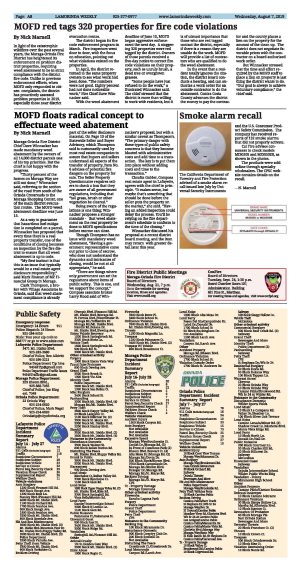| | Published August 7th, 2019
| MOFD floats radical concept to effectuate weed abatement
| | | By Nick Marnell | | |
Moraga-Orinda Fire District Chief Dave Winnacker has made mandatory weed abatement by the owners of all 14,000 district parcels one of his top priorities. But the chief is not happy with the progress.
 "Thirty percent of the homes on Moraga Way are still not done," Winnacker said, referring to the section of the road from south of the Orinda Crossroads to the Moraga Shopping Center, one of the main district evacuation routes. The MOFD weed abatement deadline was June 15.
"Thirty percent of the homes on Moraga Way are still not done," Winnacker said, referring to the section of the road from south of the Orinda Crossroads to the Moraga Shopping Center, one of the main district evacuation routes. The MOFD weed abatement deadline was June 15.
 As a way to guarantee that hazardous fuel mitigation is completed on a parcel, Winnacker has proposed that every time there is a real property transfer, one of the conditions of closing becomes an inspection by the fire district to ensure that all weed abatement is up to code.
As a way to guarantee that hazardous fuel mitigation is completed on a parcel, Winnacker has proposed that every time there is a real property transfer, one of the conditions of closing becomes an inspection by the fire district to ensure that all weed abatement is up to code.
 "My first instinct is that this is an issue that typically would be a real estate agent disclosure responsibility," said Mark Zinman of MZ Financial Group in Moraga.
"My first instinct is that this is an issue that typically would be a real estate agent disclosure responsibility," said Mark Zinman of MZ Financial Group in Moraga.
 Clark Thompson, a broker with Village Associates in Orinda, said that weed abatement compliance is already part of the seller disclosure material. On Page 10 of the Statewide Seller and Buyer Advisory, which Thompson said is customarily used by most real estate companies to assure that buyers and sellers understand all aspects of the transfer of property, Item No. 6 advises of potential fire dangers on the property for sale. The Seller Property Questionnaire requires sellers to check a box that they are aware of all government regulations, including that "tall grass, brush or other vegetation be cleared."
Clark Thompson, a broker with Village Associates in Orinda, said that weed abatement compliance is already part of the seller disclosure material. On Page 10 of the Statewide Seller and Buyer Advisory, which Thompson said is customarily used by most real estate companies to assure that buyers and sellers understand all aspects of the transfer of property, Item No. 6 advises of potential fire dangers on the property for sale. The Seller Property Questionnaire requires sellers to check a box that they are aware of all government regulations, including that "tall grass, brush or other vegetation be cleared."
 Being aware of the regulations is one thing; Winnacker proposes a stronger mandate - that weed abatement on the real property be done to MOFD specifications before escrow can close.
Being aware of the regulations is one thing; Winnacker proposes a stronger mandate - that weed abatement on the real property be done to MOFD specifications before escrow can close.
 Though Thompson has no issue with mandatory weed abatement, "Having a government representative come out prior to close of escrow, who does not understand the dynamics and intricacies of closing, would be not at all appropriate," he said.
Though Thompson has no issue with mandatory weed abatement, "Having a government representative come out prior to close of escrow, who does not understand the dynamics and intricacies of closing, would be not at all appropriate," he said.
 "There are things where only government can set the regulations about items of public safety. This is one, and we support the concept," Compass associate broker Larry Hood said of Winnacker's proposal, but with a similar caveat as Thompson's. "The primary danger with these types of public safety concerns is that they become bloated with administrative costs and add time to a transaction. The key is to put them into place without adding costs and time to the transaction."
"There are things where only government can set the regulations about items of public safety. This is one, and we support the concept," Compass associate broker Larry Hood said of Winnacker's proposal, but with a similar caveat as Thompson's. "The primary danger with these types of public safety concerns is that they become bloated with administrative costs and add time to a transaction. The key is to put them into place without adding costs and time to the transaction."
 Claudia Gohler, Compass real estate agent in Lafayette, agrees with the chief in principle. "It makes sense, but maybe that's something that should be done before the seller puts the property on the market," she said. "Having an added inspection could delay the process. You'll be relying on the fire department's schedule to conform to the time of the closing."
Claudia Gohler, Compass real estate agent in Lafayette, agrees with the chief in principle. "It makes sense, but maybe that's something that should be done before the seller puts the property on the market," she said. "Having an added inspection could delay the process. You'll be relying on the fire department's schedule to conform to the time of the closing."
 Winnacker discussed his proposal at a recent district board meeting, and the item may return with greater detail later this year.
Winnacker discussed his proposal at a recent district board meeting, and the item may return with greater detail later this year. |
| | | | | | | | | | | | |


